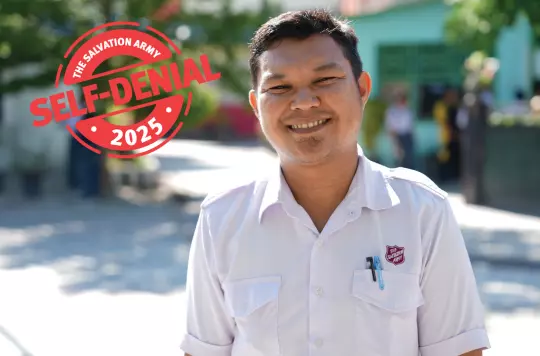1 February 2025
2 Corinthians: Growing in generosity
Major Brian Slinn
Major Brian Slinn reminds us that giving is rooted in grace.
Key text
Just before Christmas, I received a letter from the charity Barnabas Aid appealing for money to send urgently needed food to Christians in hunger. Alternatively, I could order a free box from them, fill it with food, send it to their warehouse and they would ship it to where it was needed. It was a specific and targeted request to me as a known donor and Christian and, since it was to the benefit of other Christians, they could reasonably anticipate a positive response. It was not unlike the appeal from Paul in our study passage.
Paul is raising money for Christians in Jerusalem who are in need. Writing to the church in Rome, explaining he is on his way there, Paul tells them that: ‘Macedonia and Achaia were pleased to make a contribution’ (Romans 15:26). By sharing this with them, he implies that they might like to do the same. Paul expands this theme when writing to Christians in Corinth.
Notice the language he uses. He writes: ‘In the midst of a very severe trial, their overflowing joy and their extreme poverty welled up in rich generosity… They gave as much as they were able, and even beyond their ability’ (vv2 and 3). Paul presents this as a model for the Corinthians.
Pause and reflect
- How would you react to this?
- How do you decide if or how much you can give to such appeals?
I imagine there would be some practical considerations for us. We might cite the economic challenges facing most people in the UK and Ireland today, including ourselves. We might think in terms of giving from our surplus income, money not accounted for in our outgoings. Is there any? If there is, will it curtail what I want to spend on my family or myself? These would be reasonable responses. But would we think it a privilege to give (see v4), or more like doing a favour?
The Corinthians surprised Paul. Their approach was not simply to respond in a practical way, but rather to view this request through a spiritual lens. ‘They gave of themselves first to the Lord and then to us in keeping with God’s will’ (v5 Tree of Life Version).
Their response is to indicate that their resources are available to God’s mission, and to Paul as a trusted partner. Not only do they offer ‘in faith, in speech, in knowledge, in complete earnestness and in the love we have kindled in you’ – although we imagine these graces are expressed in their lives as Christian people – but also ‘in this grace of giving’ (v7). Giving is not a competition.
Paul writes: ‘I want to test the sincerity of your love by comparing it with the earnestness of others’ (v8). He is not beyond the hard sell.
When we consider the grace offered by Jesus’ coming among us (see John 1:16) and the benefit we gain from him, our proper response is to reflect that grace towards others. That seems to be Paul’s assertion.
Considering the interests of others by the example of Jesus is more notably expressed by Paul when he writes to believers in Philippi (see Philippians 2:1–8).
Paul presses his point to shift the rhetoric to the reality of giving. It’s one thing to admit the argument of including our resources as part of the offer we make of giving our all to God; it’s another thing to actually do it.
Pause and reflect
- What makes you hesitate in your giving?
Did you think about the demands of so many charities and donor fatigue? Or did you think about giving in kind through your time and abilities? That’s thinking locally and takes us back to the challenge expressed by Paul in verse 8.
His appeal is about being the body of Christ, where ‘if one part suffers, every part suffers with it’ (1 Corinthians 12:26). It’s beyond what we give to support the mission and ministry of our local church.
This appeal is about commonality. Sharing resources ‘according to what one has, not according to what one does not have’ (v12).
Nothing is gained by impoverishing ourselves. The hope is for mutuality and reciprocity (see v14) and modelled in the early experience of the Church (see Acts 4:32).
Paul references the experience of the Israelites on their journey through the wilderness, relying on God for their daily needs, where ‘the one who gathered much did not have too much, and the one who gathered little did not have too little’ (Exodus 16:18).
Paul eventually brings the gift of money collected from the churches to Jerusalem, where he is arrested and begins his journey to Rome and imprisonment (see Acts 24:17).
Pause and reflect
- We know all about collecting money in The Salvation Army. How versed are we in the ‘grace of giving’?
The title of this study invites us to grow in generosity. Would a better approach be to grow in our discipleship? To mature our understanding about our giving? To use the lens that the Corinthians applied?
Giving is costly. Paul, however, prepares the churches for this appeal and how their gifting could be managed. He helps them plan to give (see 1 Corinthians 16:1 and 2).
I knew a couple who created a Lord’s purse from this idea, making money available to support others without disturbing their regular budget. Is this something to adopt?
The cost of maintaining a corps and its ministry also asks our support. It can seem a lot to do.
But Paul reminds us that, by God’s grace, ‘you will be enriched in every way so that you can be generous on every occasion’ (2 Corinthians 9:11).
Bible study by

Major Brian Slinn
Retired Officer, Atherstone
Discover more

Salvationist introduces the 2025 Self-Denial Appeal, which focuses on the Army’s work in Indonesia.



